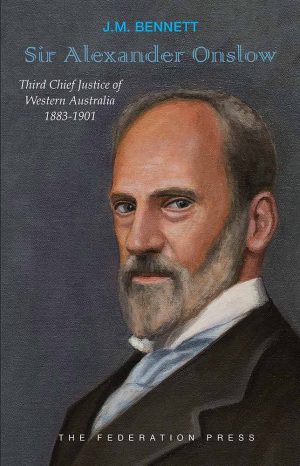Australian Jurists and Christianity provides new perspectives on the relationship between law and religion in Australia. It claims that the relationship between law and religion was more significant in Australia than has been suggested. Specifically, it suggests that Christianity was a significant influence on Australian jurists, both as public figures and as makers of Australian law.
The volume does this by means of case studies of some 24 leading Australian jurists: Lachlan Macquarie, James Stephen, Richard Bourke, John Hubert Plunkett, George Higinbotham, Samuel Griffith, Inglis Clark, Henry Bournes Higgins, Alfred Deakin, Edith Cowan, Lord Atkin, Robert Menzies, WJV Windeyer, Roma Mitchell, Gough Whitlam, Ron Wilson, Christopher Weeramantry, Gerard Brennan, William Deane, Robin Sharwood, Eddie Mabo, Murray Gleeson, Michael Kirby and John Hatzistergos.
The case studies are introduced by a substantive guide to the nature of Australian legal practice which brings out distinctive features of the Australian experience. The volume also offers suggestions for how the role of religion in Australian legal history might be rethought in the future.
This volume forms part of the international series Great Christian Jurists produced under the auspices of the Center for the Study of Law and Religion at Emory University and includes a foreword by Australia’s renowned legal historian, Bruce Kercher.
Foreword – by Bruce Kercher
Introduction: Spirit in the Temporal – by Geoff Lindsay and Wayne Hudson
1. Lachlan Macquarie (1761-1824) by Marie Bashir
2. James Stephen (1789-1859) by Stephen Tong & Robert Tong
3. Richard Bourke (1777-1855) by Roy Williams
4. John Plunkett (1802-1869) by John McLaughlin
5. George Higinbotham (1826-1892) by Marion Maddox
6. Samuel Griffith (1845-1920) by Simon Chapple
7. Andrew Inglis Clark (1848-1907) by Richard Ely
8. Henry Higgins (1851-1929) by Stuart Macintyre
9. Alfred Deakin (1856-1919) by Stephen Free
10. Edith Cowan (1861-1932) by Tony Cunneen
11. Lord Atkin (1867-1944) by Peter Applegarth
12. Robert Menzies (1894-1978) by Anne Henderson
13. Victor Windeyer (1900-1987) by Carol Webster
14. Roma Mitchell (1913-2000) by Susan Magarey
15. Gough Whitlam (1916-2014) by James McComish
16. Ronald Wilson (1922-2005) by Mandy Tibbey
17. Christopher Gregory Weeramantry (1926-2017) by Esther Li Ean Khoo
18. Francis Gerard Brennan (b. 1928) by Patrick Keyzer
19. William Deane (b. 1931) by Arthur Emmett
20. Robin Sharwood (1931-2015) by Rowena Armstrong
21. Eddie Mabo (1936-1992) by Kevin Smith
22. Murray Gleeson (b.1938) by Michael Pelly
23. Michael Kirby (b.1939) by Nicolas Kirby
24. John Hatzistergos (b. 1960) by Johnny Sorras
Conclusion: Rethinking ‘Religion’ and ‘Law’ in Australia – by Wayne Hudson and Geoff Lindsay
Of course, we can look back at Australia’s history since European invasion to consider the Christian influence on law as it was received and developed. But, more importantly, and unusually for a volume of this type, the editors also ask us to look ahead, to subject our law to a searching critique in order to understand better not only what might be positive in its Christian sources, but also what might be a burden upon contemporary law and in need of redress.
Paul T Babie, Adelaide Law Review, 42(2), 2021
‘As with any book of high-quality essays, the editors deserve praise not only for their selection, but also for their editing to ensure that consistent formatting and quality is achieved.
The summation chapter draws insights from the preceding biographies, suggests new lines of enquiry, and offers a fresh perspective. Perhaps for those who know the issues and Australian history in-depth, Christianity refers to a variety of quarrelsome denominations. Clearly, though, for most Australian jurists and politicians, at the very least, Christianity was the light in the room, which implies “a morally decent approach to life and the administration of temporal affairs.” This suggests, the editors say: “ the importance of a quiet Christianity in Australia, not least among the Indigenous, and to a common commitment to a modest form of sacred secularity in practical life.” In presenting their case for that proposition the editors succeed admirably.’
Michael Easson, Journal of the Australian Catholic Historical Society, [42} 2021
‘This book is a trove of historical and legal analysis, enriched by the wide-ranging experiences and perspectives of its authors. It is a welcome contribution to ongoing efforts to define both ‘religion’ and ‘law’ in the Australian context, and to explain the role of religion in Australian life more broadly.’
Douglas McDonald-Norman, 122 [2021] (Winter) Bar News
‘Lindsay and Hudson say in their overview that they looked for those “who contributed to Australia’s constitutional development, those who privileged ‘black letter’ law, those who fought for social justice of Indigenous peoples and those who were concerned with social reform more generally”.’
Michael Pelly, Legal Affairs Editor, The Australian Financial Review, Mar 31 2021
‘[Gleeson] suggested that effective laws have a moral foundation and religion had helped fill a void.’
– Michael Pelly
Hear Chris Merritt, Justice Geoff Lindsay, Professor Wayne Hudson & Anne Henderson AM speak about Australian Jurists + Christianity at The Sydney Institute.







